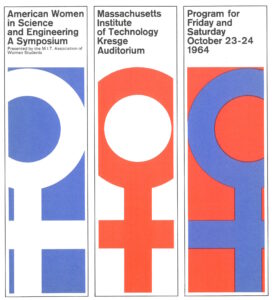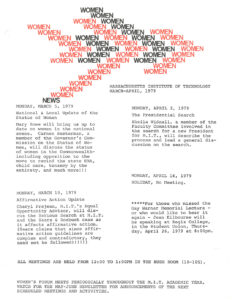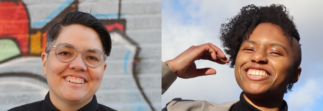Liz Andrews, associate head, Institute Archives and Special Collections, and archivist for collections, recently came across an interesting document in the Institute Archives, just in time for Women’s History Month.
In October 1964, the MIT Association of Women Students sponsored “American Women in Science and Engineering: A Symposium,” inviting student delegates from more than 200 universities to join them at MIT. An advisory committee gathered names of distinguished female scientists and engineers, several of them African American, to be invited who could “be planted in the audience to spark discussion.”
Among these notable women were Katherine G. Johnson, the physicist and mathematician whose calculations were critical to NASA missions sending astronauts into orbit and to the moon and whose story is chronicled in Margot Lee Shetterly’s Hidden Figures; Yvonne Young Clark, the first female faculty member in the College of Engineering and Technology at Tennessee State University; and Inez Bellamy Hazel, a computer programmer and systems analyst who held senior positions at Lincoln Lab and MIT. The program notes that Lillian Moller Gilbreth, a pioneering psychologist and industrial engineer considered the “mother of modern management,” served as the first Webster-Mauze Lecturer at MIT at age 86.
Institute Archives and Special Collections has been focusing increasingly on documenting aspects of MIT’s history that have been underrepresented, and women faculty in science and engineering at MIT has been one such area.
Now, thanks to the generous support of Barbara Ostrom ‘78, the MIT Libraries are launching a Women in Science and Engineering@MIT archival initiative. Building upon the existing collections in the Institute Archives, the Libraries seek to acquire, preserve, and make accessible the archives of MIT’s notable female faculty in science and engineering.
Andrews is project archivist for the initiative, bringing more than 25 years of experience and extensive knowledge of MIT history to the role. She has recently been working with records of the MIT Women’s Forum and Special Assistant to the President (and later Ombudsperson) Mary Rowe, and will be assessing next steps to transfer additional administrative records relating to gender equity issues. A primary focus is to acquire the personal archives of women faculty, such as the first women faculty members in science (Emily Wick, 1959) and engineering (Sheila Widnall, 1964), to document their research, teaching, service, and professional lives — collections of great interest to researchers.
“As the number of women faculty and associated projects and initiatives has increased over the past 50 years, this time of growth and tremendous accomplishment needs to be better represented in the Archives,” says Andrews.
Related Video
Storied Women of MIT


